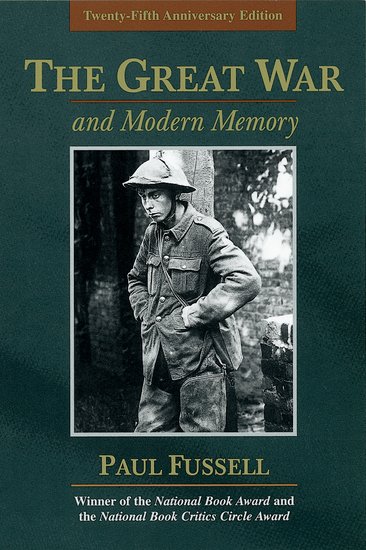Scholar Paul Fussell passed away on Wednesday at the age of 88. He was Donald T. Regan Professor Emeritus of English Literature at the University of Pennsylvania and the author of several works, including three with Oxford University Press: The Great War and Modern Memory, Wartime: Understanding and Behavior in the Second World War, and Abroad: British Literary Traveling between the Wars. Named one of the twentieth century’s 100 Best Non-Fiction Books by the Modern Library, The Great War and Modern Memory was the winner of the National Book Award and the National Book Critics Circle Award.
“As a college student, I created and pursued an independent major in Victorian and Edwardian Studies at Brown and St. Hugh’s College, Oxford, but the Edwardians and the impact of World War I on the world they knew was where my greatest interests lay. Fussell’s analysis of the interplay between history and literary output on the young men who experienced ‘the long weekend’ and then the trauma and tragedy of modern war was deeply influential to me. It particularly inspired me to look at the cultural experiences of the young women who faced the war alongside the men, especially those who went up to Oxford and Cambridge and left to do war work, such as Vera Brittain and Winifred Holtby. The Great War indelibly shaped their futures and they used literary forms, memoir and fiction, to express themselves as survivors of the lost generation. Paul Fussell pioneered the cultural history of war, which had long been sidelined to hardcore military history, and his loss is particularly poignant as we approach the centenary of World War I. No doubt there will be an outpouring of worthy new books on the war but no one will ever replace The Great War and Modern Memory.”
— Susan Ferber, Executive Editor, Oxford University Press USA
“For anyone who studied the period — or merely fascinated by it — The Great War and Modern Memory came as a revelation. For students of literature, it pointed to what became Historicism, grounding literary texts not in free-floating theory but in the mud of World War One, and showing how these poems, diaries, novels, and letters reflected the massive change — in every respect, including language itself — brought about by the cataclysm of the war. For general readers Fussell’s book offered the experience of war in a way they hadn’t had with Barbara Tuchman or others; this wasn’t military history, but something richer, deeper, and far more disturbing. As you read, you sensed that he knew war, that this was far more than merely an academic exercise. The book is dedicated to the memory of, ‘Technical Sergeant Edward Keith Hudson, ASN 36548772 Co. F, 401th Infantry killed beside me in France, March 15, 1945’. For generations of readers, The Great War and Modern Memory represented and embodied Oxford’s list: a model of accessible scholarship, huge ambition, hard-minded research, and haunting detail.”
— Tim Bent, Executive Editor, Oxford University Press USA
“Over 30 years ago, when I walked into my first account selling books from Oxford University Press, the buyer handed me a book and told me that if I were to represent OUP, I should begin by reading The Great War and Modern Memory by Fussell. Now, so many years later, I still consider this book one of the top 5 books I have had the pleasure of selling and reading. It is not only was a great read, it sparked a life-long interest in me for WWI poetry and history.”
— Gerry Kallman, Sales Representative for Oxford University Press
22 March 1924 – 23 May 2012





Hemingway wrote about the fear and despair of Battle of the Bulge in Across the River and into the Trees, but since the novel has a dying soldier unwillingly remembering what he wishes to forget, it is mystifying. No history of the war explained the reasons for the Hemingway protagonist’s grim desolation as well as Paul Fussell in The Boys Crusade.